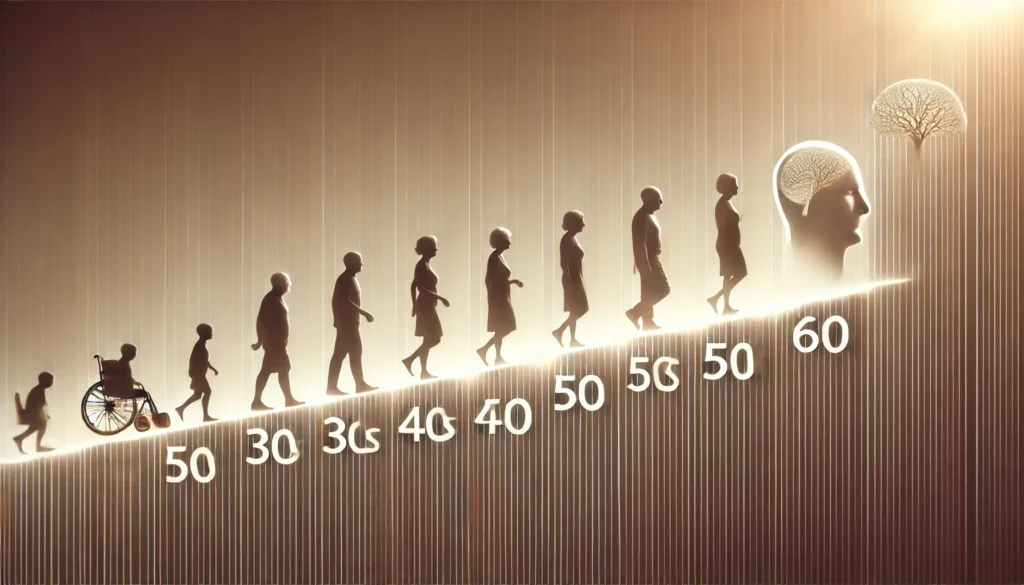Introduction
Dementia is often thought of as a condition that affects the elderly, usually developing in the later decades of life. However, a growing body of medical research and patient advocacy has shed light on a lesser-known but equally impactful phenomenon: early onset dementia. Contrary to common assumptions, dementia can begin much earlier than expected, sometimes as early as one’s 30s or 40s. These cases, while less common, are often misdiagnosed or overlooked due to the perception that dementia is exclusively a disease of old age. This misperception can lead to delayed diagnosis, missed treatment opportunities, and immense emotional strain on individuals and their families.
You may also like: How to Stop Cognitive Decline: Science-Backed Steps for Prevention and Brain Longevity
This article explores in depth the question, how early can dementia start, and what signs should be watched for in younger adults. We’ll review the science of early onset dementia, including its symptoms, progression, risk factors, and diagnostic challenges. We’ll also address common questions like what age can dementia begin, what is dementia like at an early stage, and how to distinguish familial dementia symptoms from other neurological or psychiatric conditions. Additionally, we’ll explore current testing methods, including the early onset dementia symptoms test, and discuss how to support individuals facing this life-altering diagnosis at a time when they least expect it.

What Age Can Dementia Start? Debunking Common Myths
One of the most persistent myths surrounding dementia is that it only affects people over the age of 65. While it’s true that the risk of dementia increases with age, early age dementia is a medically recognized condition that affects thousands of individuals worldwide. In fact, according to the Alzheimer’s Association, approximately 5% to 6% of people with Alzheimer’s disease experience alzheimer early onset, with symptoms beginning before age 65. This means that out of the millions of people living with dementia, a significant number are dealing with the challenges of the disease during what are typically considered the prime years of their lives.
So, what age can dementia begin? The answer is that dementia can begin as early as age 30, though onset between 40 and 60 is more typical in early cases. This wide age range highlights the importance of vigilance. Asking what age does dementia usually start is relevant for clinical and personal awareness, but it’s equally critical to recognize that individual variability plays a huge role. Genetics, lifestyle, and underlying health conditions all influence when symptoms may emerge.
The question, how early can you get dementia, is not just theoretical—it’s personal for many families. Individuals in their 40s and 50s may be actively working, raising children, or pursuing higher education when symptoms begin to subtly interfere with memory, executive functioning, or emotional regulation. Understanding that dementia doesn’t wait for retirement age is crucial for early detection and intervention.
Understanding Early Onset Dementia
Early onset dementia, sometimes called young onset dementia, refers to dementia diagnosed before the age of 65. It encompasses a broad range of conditions, including Alzheimer’s early onset, frontotemporal dementia, and even vascular dementia in younger adults. While Alzheimer’s disease remains the most common form across all age groups, its presentation in younger individuals can be more varied and often more difficult to diagnose due to overlapping symptoms with stress, depression, or anxiety.
The signs of dementia progression in younger individuals can also differ slightly from those seen in older adults. Younger patients may initially struggle with work-related tasks, exhibit changes in personality, or become disorganized in ways that don’t immediately suggest memory loss. These subtle changes often go unrecognized as part of the 1st stage of dementia and may be attributed to lifestyle stressors, further delaying accurate diagnosis.
A common question is what age do you get dementia, and while statistics suggest most cases begin after 65, increasing numbers of diagnoses under 60 show that this condition does not adhere to strict age boundaries. What age can dementia start is thus a question with broader implications: it urges healthcare professionals to lower their diagnostic threshold and encourages individuals to pay closer attention to unexplained cognitive changes, regardless of their chronological age.

What Are the Symptoms of Alzheimer Dementia in Younger Adults?
To identify early onset dementia, it’s vital to understand what are the symptoms of Alzheimer dementia in younger patients. While memory loss is a hallmark symptom, the early stages can involve other cognitive and behavioral changes. Common young onset dementia symptoms include difficulties with problem-solving, trouble finding the right words, confusion with time or location, and decreased or poor judgment.
Some individuals may experience changes in mood or personality, such as becoming more irritable, anxious, or depressed. Because these changes can mimic mental health conditions, early dementia is often misdiagnosed as depression, bipolar disorder, or burnout—especially when the patient is younger.
As the condition progresses, physical symptoms of dementia may begin to appear. These can include poor coordination, muscle weakness, or tremors, particularly in conditions like Lewy body dementia or Parkinson’s disease dementia. For some, these symptoms emerge in tandem with cognitive decline, while in others they may present later in the disease course.
Another concern that arises is does dementia make you look older? While dementia itself doesn’t directly age a person’s physical appearance, the effects of stress, fatigue, and neurological decline can contribute to a worn or aged appearance over time. Combined with the stigma and emotional toll of early onset dementia, this perception may reinforce a feeling of accelerated aging in affected individuals.

How Early Can Dementia Begin in Genetically Linked Cases?
When asking how early can dementia begin, especially in genetically predisposed individuals, the answer may be alarmingly young. In rare cases of familial Alzheimer’s disease, symptoms can start in a person’s 30s or even late 20s. These inherited forms of dementia are usually linked to mutations in specific genes such as APP, PSEN1, and PSEN2. While they represent a small fraction of overall dementia cases, they highlight the need for heightened awareness in families with a strong history of neurodegenerative disease.
These familial dementia symptoms often mirror those seen in typical Alzheimer’s but with earlier onset and sometimes more aggressive progression. Understanding family history and undergoing genetic counseling can help in how to diagnose early onset dementia, especially when symptoms are ambiguous and the individual is otherwise in good health.
For those at risk, early screening and monitoring can make a significant difference. Advanced imaging techniques, biomarker testing, and neuropsychological assessments now make it possible to detect dementia earlier than ever. While there is currently no cure, early detection allows for timely intervention, lifestyle adjustments, and planning.
Recognizing the 1st Stage of Dementia
The 1st stage of dementia is often the most subtle—and most overlooked—phase of the disease. This stage, sometimes referred to as mild cognitive impairment (MCI), involves mild but noticeable changes in thinking, memory, and language that go beyond what is expected with normal aging. It is in this phase that alzheimer early onset may first show itself, particularly through small lapses in short-term memory, difficulty multitasking, or decreased ability to concentrate.
Identifying the early onset dementia symptoms test at this stage is crucial. Simple screening tools, combined with in-depth neurocognitive evaluations, can help distinguish between normal forgetfulness and early pathological decline. Some red flags include repeatedly misplacing items, forgetting names of familiar people, or struggling to follow conversations.
Recognizing this early stage allows for early interventions—both medical and lifestyle-related—that may slow progression. For younger individuals, this stage may include subtle difficulties at work, challenges managing finances, or shifts in emotional regulation, often mistaken for external stress.
Physical Symptoms of Dementia in Younger Adults
While cognitive changes dominate discussions around dementia, it’s essential not to overlook physical symptoms of dementia. In younger adults, these symptoms may include changes in coordination, balance issues, changes in posture, or stiffness in movements. Sometimes, visual perception is affected, leading to increased clumsiness or difficulty judging distances.
Because these signs are less commonly associated with cognitive disorders, they may initially be interpreted as orthopedic, neurological, or stress-related issues. That’s why physicians should consider a holistic view of both mental and physical symptoms when evaluating potential early onset dementia.
Another debated but increasingly explored question is, are headaches an early sign of dementia? While headaches are not a classic symptom of dementia, they may be present in some forms of cognitive disorder linked to vascular issues or cerebrospinal fluid abnormalities. Frequent headaches in combination with other cognitive symptoms should prompt further investigation, especially if there’s a family history or other risk factors.
Stages of Dementia Symptoms and Their Progression
Understanding the stages of dementia symptoms can help individuals and caregivers prepare for what lies ahead. Most experts divide dementia progression into early, middle, and late stages. Each phase is marked by increasingly severe symptoms. In the early stage, memory problems, difficulty concentrating, and mild disorientation may occur. The middle stage often brings language difficulties, more pronounced confusion, changes in sleep, and difficulty with daily tasks. By the late stage, individuals may lose the ability to communicate, recognize loved ones, or care for themselves.
Recognizing signs of dementia progression is essential to managing expectations and planning supportive care. For younger individuals, each stage may unfold differently due to differences in brain plasticity, overall health, and lifestyle demands.
It’s also vital to understand what is it like to have dementia at different stages. In the early stages, many people remain aware of their limitations, which can lead to frustration, embarrassment, and depression. Emotional awareness may persist even as cognitive decline deepens, creating a complex inner world for the person living with dementia.

The Diagnostic Process: How to Diagnose Early Onset Dementia
The path to diagnosis can be long and emotionally taxing. Because early onset dementia is relatively rare, many doctors are not quick to consider it in younger patients. The diagnostic process typically involves several stages: medical history, physical exams, cognitive assessments, imaging studies like MRI or PET scans, and sometimes lumbar punctures or blood tests for biomarkers.
Tools like the early onset dementia symptoms test can be instrumental in guiding physicians toward the right conclusions. These evaluations assess memory, language, executive function, spatial awareness, and emotional regulation. In cases where familial dementia is suspected, genetic testing can be conducted to confirm inherited risk.
Clinicians must be careful not to rely solely on age when evaluating a patient’s symptoms. The question when can you get dementia should always be answered with an understanding that cognitive decline can—and does—happen earlier than many assume. Diagnostic delays can have profound implications for patients and families who may miss the critical window for planning, intervention, and psychological support.
The Human Impact: What Is Dementia Like at a Young Age?
To truly understand the experience of early onset dementia, one must ask, what is it like to have dementia in your 40s or 50s? The psychological and social impact is often devastating. Individuals may be forced to leave their jobs, give up driving, or withdraw from social engagements due to embarrassment or fear of stigma. The loss of identity, purpose, and independence can be profound.
Caregivers also face immense strain, often balancing caregiving responsibilities with work, parenting, and other demands. The emotional toll is compounded by the rarity of the condition, which can leave families feeling isolated and unsupported.
Support groups, therapy, and educational resources are essential in helping individuals cope. While dementia may rob a person of certain abilities, it does not strip away their humanity. Understanding, patience, and compassion are crucial in every interaction.
Frequently Asked Questions
1. What age does dementia usually start?
Dementia typically starts after the age of 65, but early onset dementia can begin much earlier—sometimes in the 30s or 40s. The average age for early onset diagnosis is between 45 and 60, though some genetic cases may appear even earlier. It’s essential to recognize that dementia is not just a disease of old age and can affect individuals during their most productive years.
2. What are the earliest signs of Alzheimer’s disease?
Alzheimer symptoms often begin subtly, with short-term memory loss, trouble finding words, and difficulty concentrating. In younger individuals, these may be mistaken for stress or burnout. Emotional changes, such as increased irritability or depression, are also early indicators. Recognizing these signs of Alzheimer disease early is crucial for timely diagnosis and intervention.
3. How do you test for early onset dementia?
Testing includes cognitive assessments, brain imaging (MRI, PET), and sometimes genetic testing for inherited forms of the disease. The early onset dementia symptoms test evaluates memory, language, attention, and other cognitive domains. These tools help clinicians distinguish dementia from other causes of cognitive impairment like depression or anxiety.
4. Is early onset dementia hereditary?
In some cases, yes. Familial dementia symptoms arise from inherited mutations and are passed down genetically. These cases often appear earlier and progress faster. Genetic counseling is recommended for individuals with a strong family history of Alzheimer’s or other forms of dementia.
5. Can physical symptoms appear before cognitive ones?
Yes, physical symptoms of dementia such as balance problems, muscle stiffness, or changes in movement can precede or accompany cognitive symptoms, especially in less common forms like Lewy body dementia. These symptoms should not be dismissed, especially when paired with behavioral or emotional changes.
6. What lifestyle factors increase the risk of early dementia?
Chronic stress, poor sleep, lack of exercise, unhealthy diet, and cardiovascular issues all contribute to dementia risk. Addressing these factors early may help delay or mitigate the onset of early age dementia. Preventive strategies are particularly important for those with a family history.
7. Are headaches a warning sign of dementia?
Are headaches an early sign of dementia is a nuanced question. While headaches are not a classic early symptom, they may indicate underlying vascular or neurological issues that can contribute to cognitive decline. Persistent or unusual headaches in conjunction with other symptoms should prompt further medical evaluation.
8. What’s the difference between early onset and young onset dementia?
These terms are often used interchangeably. However, young onset dementia symptoms may refer more specifically to individuals under 50, while early onset includes anyone diagnosed before age 65. Both highlight the importance of timely diagnosis in younger populations.
9. Does early dementia progress faster?
Signs of dementia progression in early onset cases can vary. Some studies suggest that early onset may progress more rapidly due to delayed diagnosis and aggressive pathology. Others find that progression rates are similar across age groups, depending on the type and cause of dementia.
10. Can dementia be reversed if caught early?
Currently, there is no cure for dementia, and it cannot be reversed. However, early diagnosis allows for medical and lifestyle interventions that may slow progression. Cognitive therapy, medications, and lifestyle changes can improve quality of life and delay severe decline.

Conclusion
The question how early can dementia start is no longer theoretical—it’s a medical and social reality affecting countless families around the world. From early onset dementia cases in their 40s to rare familial dementia symptoms appearing in one’s 30s, dementia does not wait for old age to strike. The importance of recognizing alzheimer early onset and intervening during the 1st stage of dementia cannot be overstated. Understanding the broad array of young onset dementia symptoms, from subtle memory lapses to more overt physical symptoms of dementia, empowers individuals to seek help earlier and make informed decisions about their health.
Questions like what age can dementia begin or how to diagnose early onset dementia should prompt us to rethink traditional diagnostic thresholds. Whether someone is noticing cognitive fog at work, experiencing unusual emotional swings, or seeing behavioral changes in a loved one, it’s vital to listen, validate, and act.
There may be no definitive cure, but with early recognition, medical guidance, and compassionate support, individuals facing early age dementia can lead meaningful lives. The goal isn’t just to delay disease progression—it’s to uphold dignity, preserve identity, and create space for understanding in a world where time feels suddenly, heartbreakingly short.
Was this article helpful? Don’t let it stop with you. Share it right now with someone who needs to see it—whether it’s a friend, a colleague, or your whole network. And if staying ahead on this topic matters to you, subscribe to this publication for the most up-to-date information. You’ll get the latest insights delivered straight to you—no searching, no missing out.



